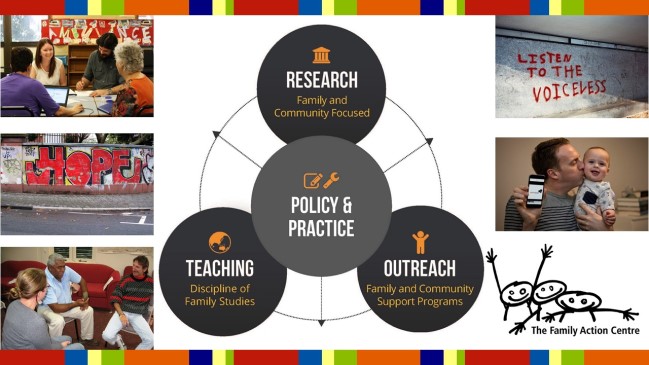
Today I’m giving a two minute “pitch” about research at the Family Action Centre (FAC) as part of a research day for the School of Health Sciences, University of Newcastle. Even though we are not a health science and you might expect us to be more aligned with social sciences or social work, we are part of the School of Health Sciences in the Faculty of Health. During a restructure many years ago (probably in the 90s) the FAC was placed in the Faculty of Health as an independent research centre. In a more recent restructure when we needed to join a school within the faculty, we joined Health Sciences because, like us, they had a real focus on professional practice.
The brief for the pitch is “Your challenge is to show how your discipline’s research contributes to a consumer, client or potential industry partner in 120 seconds aided by 1 slide and a prop.” The slide is above, and the prop is one of our FAC flags.
Here’s my pitch.
Since our beginning 1986, the Family Action Centre has focused on changing policy and practice. We do this through research, teaching and outreach. At these research days you only see a small part of our team, because most of them are in the field supporting local families and communities. Growing from a foundation in practice, our research is usually very closely related to practice. Rather than researching the extent of social disadvantage in the Hunter, you are more likely to find us researching strategies to address this social disadvantage, for example a collective impact project promoting health and wellbeing in Muswellbrook by leading the research and ensuring the initiative is data driven. It is this combination of research and practice that makes our approach special.
Because we often explore how to address wicked problems that are multifaceted and confusing, it’s essential we work in partnership with families and practitioners.
The FAC is probably best known for research relating to fathers. From humble beginnings supporting local community services to improve father engagement, the fathers and families research team now have an international reputation in creating innovative, 21st century approaches to supporting fathers. For example, the SMS4Dads project has led to a range of partnerships (including some in this room) to adapt the approach to other contexts.
But this is only one part of our research agenda. Our other research focus, Strong Families—Capable Communities, involves a range of projects with community partners include working with Uniting to explore best practice in post separation counselling and mediation, and a new partnership with Insurance and Care NSW (icare), and its network of practitioners, to trial digital, compassion-focused approaches to supporting the wellbeing of injured workers.
Through our research partnerships we are able to build on the strengths and aspirations of families and communities to create lasting change.
If you liked this post please follow my blog, and you might like to look at:
- My current projects (April 2019)
- What is asset-based community-driven development (ABCD)?
- An introduction to strengths-based practice (a video lecture)
- 10 things I’ve learnt about strengths-based community engagement
- Power and strengths-based practice
- 36 ideas for helping to engage fathers
If you find any problems with the blog, (e.g., broken links or typos) I’d love to hear about them. You can either add a comment below or contact me via the Contact page.


Thanks Graeme. An easy to read and comprehend article of the great work of the FAC. Highlights the importance of partnerships in different forms.
LikeLike
Thanks Judi – it was so hard to work out what to emphasise in two minutes.
LikeLike